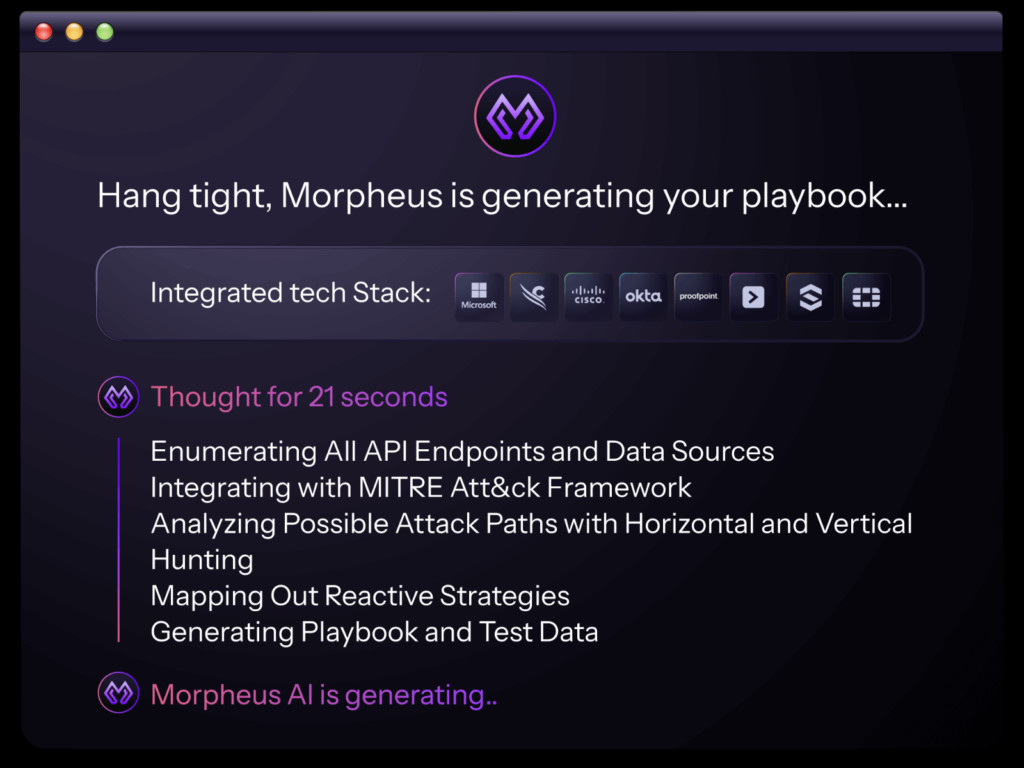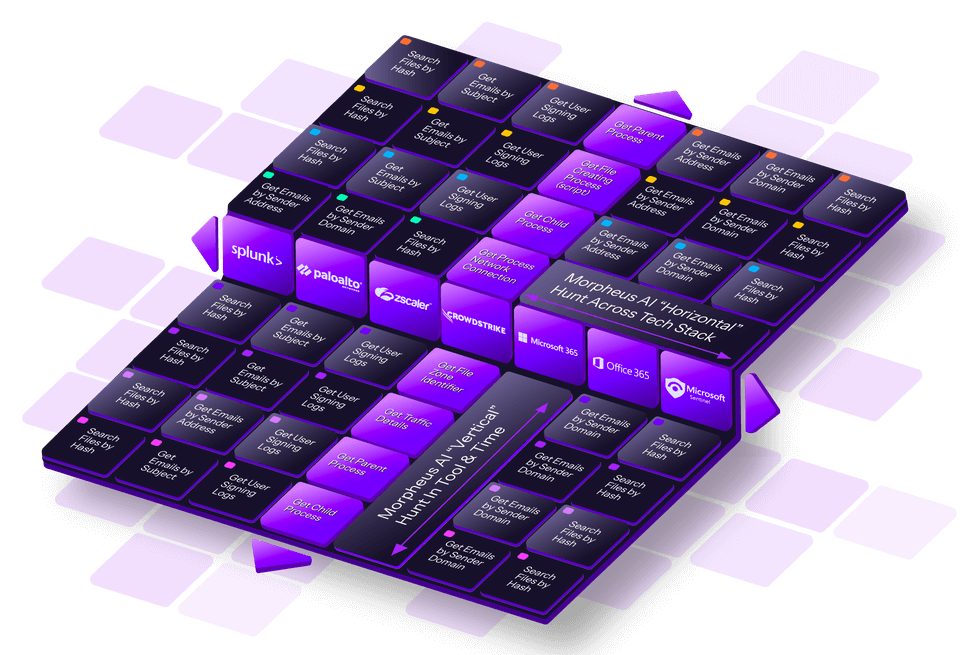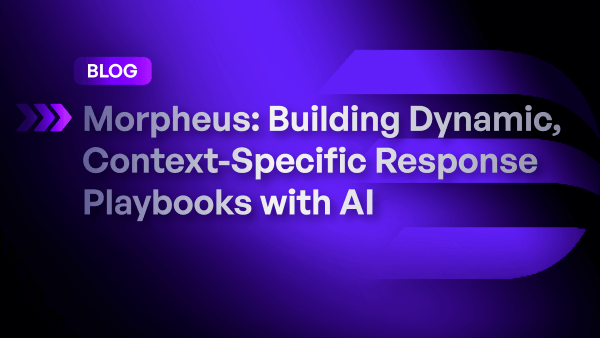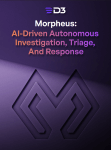Security Orchestration, Automation and Response (SOAR) tools emerged as a solution to the overwhelming volume of security alerts. But they came with a critical flaw: the burden of managing playbooks. SOAR platforms require security teams to create, test, and update dozens or more static playbooks as threats and tooling change, investing substantial engineering hours for operational gains.
Enter Morpheus: AI-Powered Playbook Generation
Morpheus, D3’s autonomous AI-powered autonomous SOC solution, solves this problem. Instead of requiring exhaustive playbook engineering, Morpheus uses a gen AI-powered dynamic workflow system to generate comprehensive response workflows. These are tailored to each specific alert, and adapted to your unique security stack.
These stack-adaptive, context-aware playbooks leverage a world of data for correct actions. It’s a fundamental shift from the manual playbook creation process that has burdened security teams for years.
How Morpheus Generates Response Workflows in Minutes
Morpheus AI uses an internal Large Language Model (LLM) to contextually create complex playbooks for both response actions and proactive threat hunting. Not just incident response playbooks, Morpheus can also generate pre-processing playbooks, which are used to manage and refine security alerts before they are escalated for further investigation or incident response. These pre-processing playbooks perform several key functions:
- Normalization: Standardizing data from various sources into a consistent format.
- Correlation: Linking related alerts together to provide a more complete picture of an event.
- Deduplication: Removing duplicate alerts to reduce noise.
- Standardization: Ensuring all data fields adhere to a specific structure.
- Alert Vetting: Analyzing alerts to determine their legitimacy and severity.
- Noise Reduction: Filtering out false positives and less critical alerts.
- Escalation: Forwarding important alerts to the appropriate analyst team for action.
These playbooks automate initial investigations, such as file reputation checks, hash verification, and IP verification against threat intelligence, which are often part of Tier 1 security operations. They ultimately determine whether an alert should be dismissed or escalated into an incident response playbook.
Whether it’s a pre-processing playbook or an incident playbook, the playbook generation process in Morpheus takes a few minutes:

Initiation & Tech Stack Definition
SOC teams can generate playbooks through prompt-based input or by analyzing ingested alerts. Users typically begin by providing a sample alert and defining their security tech stack—including EDR, SIEM, email security, and other tools. For optimal context, Morpheus recommends selecting at least three or four telemetry sources to establish a comprehensive view of potential attack paths.
AI-Driven Playbook Generation
Leveraging both the alert data and the specific tech stack information, Morpheus generates a context-aware playbook designed specifically for the user’s environment. Unlike template libraries, this tailored response workflow is informed by the specific threat and your unique security ecosystem. What truly sets Morpheus apart is its ability to harness “an entire world of context” to ensure correct actions. The generated playbooks incorporate two critical analysis dimensions:
- Vertical Analysis: Tracing the attack timeline chronologically, examining upstream activities that preceded the alert and downstream consequences that followed
- Horizontal Analysis: Correlating IOAs and IOCs across your entire tech stack to identify related events and entities, revealing the full scope of the attack

Transparent, and Iterable Playbooks, Ready for Deployment
Morpheus produces transparent and tweakable YAML playbooks, offering full visibility into AI actions and decisions for complete analyst control. These can be used in the incident workspace to derive AI-driven insights, including attack timelines, summaries, correlation graphs IOCs, and more.
A Flexible Approach to SOC Automation
Morpheus recognizes that while automation delivers enormous efficiency gains, security teams need flexibility in how it’s applied:
- Fully Autonomous Mode: For routine alerts, Morpheus can investigate, triage, and respond without human intervention, dramatically reducing alert fatigue.
- Guided Remediation Mode: For more complex incidents, Morpheus prescribes clear, actionable fixes for any incident. Human responders stay in control—approve or modify steps to safely neutralize threats.
Implementation Without the Pain
Perhaps most importantly, Morpheus eliminates the traditional implementation barriers associated with security automation:
- No Rip-and-Replace Required: Morpheus sits on top of your existing stack, giving a big-time upgrade without the overhaul. Totally vendor agnostic, Morpheus extends connective tissue deeply throughout your products.
- Rapid Time-to-Value: With no playbooks to build, Morpheus destroys traditional timelines for implementation, playbooks, triage, and ROI. Turn months of work into mere seconds.
- Works with Any Stack: Morpheus sits on top of any product or stack, providing an AI-driven autonomous response fabric that adapts to changes in architecture.
The Operational Impact of Morpheus
Organizations implementing Morpheus report transformative results:
- 95% of alerts triaged in under 2 minutes – without human intervention
- 100% alert coverage across the entire security stack
- Zero playbook maintenance overhead as security tools and threats evolve
- Dramatic reduction in alert fatigue as analysts focus only on confirmed threats
Coming up Next: Morpheus’s AI-Assisted Workspace
This blog focused on Morpheus’ playbook generation capabilities, but it’s just one part of a comprehensive solution. Building on our introduction to Morpheus as an Autonomous SOC solution, our upcoming blog will showcase its AI-assisted workspace features that leverage conversational interfaces, automated reporting, and intelligent case management to create a seamless operational environment where analysts can work with unprecedented speed and insight. Ready to see how Morpheus can transform your security operations? Schedule a demo to witness its revolutionary approach to workflow automation firsthand.




